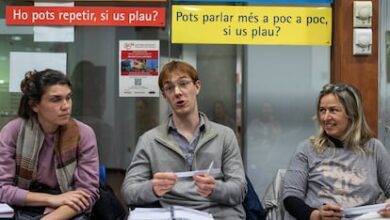
Catalonia is witnessing a major shift in its education system: schools affiliated with Opus Dei are facing a wave of families leaving. The reason is the announced transition of these schools to private funding, which is set to be completed by 2026. Parents are already submitting applications en masse to transfer their children to other schools, fearing a sharp increase in tuition fees.
The situation is particularly acute in well-known institutions like La Vall and La Farga. During the latest pre-registration period, more than a hundred families expressed the desire to move their children to a different school, and many of them have already secured places in public or subsidized institutions. However, not everyone succeeded: demand for alternative schools has exceeded the number of available spots.
In recent years, the administrations of these schools have faced a tough choice: either abandon single-sex education for boys and girls to keep receiving government funding, or remain faithful to their traditional model and become fully self-financing. After lengthy discussions, most schools chose the latter, which triggered the current exodus of students.
Financial changes and parents’ response
Transitioning to private status means not only losing annual government subsidies, but also the need to overhaul the entire financial strategy. School administrators have already announced a gradual increase in tuition fees through 2031. For many families, this has been a decisive factor: they are not prepared for the additional expenses and prefer to seek more affordable options.
In response to these changes, parent action groups have formed in some schools, demanding greater transparency from the administration and clarification about the schools’ future. Their concerns go beyond rising costs: they are also worried about the uncertainty surrounding educational quality and the schools’ long-term stability.
Mergers and new survival strategies
To cope with financial difficulties, several schools have announced mergers with their ‘twins’—equivalent institutions for boys or girls. This move is intended to optimize expenses, pool resources, and make the schools more attractive to prospective students. However, even these measures do not guarantee a complete solution: the number of applications has already dropped by 10–14%, and spots that were once in high demand are now left unfilled.
Among the latest to undergo such changes are the Xaloc and Pineda schools in L’Hospitalet de Llobregat. They have announced a large-scale reorganization to offset the loss of state subsidies and maintain financial stability. Measures include merging educational programs, cutting administrative costs, and expanding vocational training options.
The Future of Private Schools in Catalonia
It remains unclear whether switching to private funding will lead to further student departures or if the situation will stabilize. School administrators hope that strategic changes will help retain most families, but recent statistics show a different trend: interest in enrollment is declining, and the number of those looking to leave is growing.
Catalonia’s education system is undergoing a period of transformation, and the fate of Opus Dei schools could become a precedent for other private and religious institutions in the region. Parents, meanwhile, continue to search for the best solutions for their children, weighing tradition, educational quality, and financial considerations.












